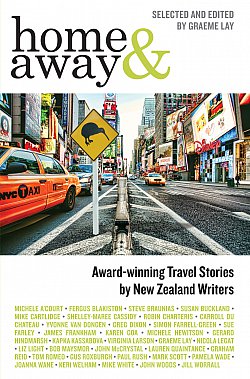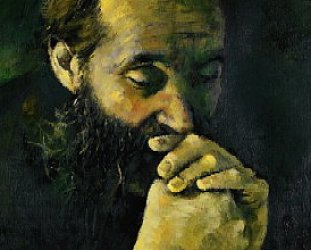Graham Reid | | 4 min read

“White sand? Tick. Turquoise sea? Tick. Sunset cocktails? Yep.”
That was the opening line of a travel newsletter that dropped into my inbox the other day. I wouldn’t have given it a second thought, except that I was part way through home & away, a new collection of award-winning Kiwi travel writing (New Holland $35).
As a young travel writer still trying to nut out the market and make my mark, I was struck by how different the home & away stories were from much of the travel writing published in newspapers, magazines and online.
These stories in the collection were published in newspapers and magazines, but they’re cut from a different cloth.
Echoing the tradition of writers like Paul Theroux or A.A. Gill, they’re free of the breezy flippancy that too often supplants real insight in travel writing (most of us have been guilty of that). And there’s not a cocktail at sunset in sight.
Each journey is different and travel is exploration. But many of the journeys in the mainstream travel media have a similar ring to them: the paths are narrow, experiences are recycled and expectations are largely fulfilled. We’ve created a seductive bundle of clichés for travellers and travel writers.
Sometimes I find myself wishing the narrative of a trip I’m on were slightly different. I catch myself – mid-journey – pining for the trip that matches the story I want to write (or think a travel editor will want to buy). But then I kick myself. What is actually happening around me?
It’s what is happening that the writers capture in home & away.
They convey the messy miscellany of being on the road and many of the stories are content to wander, to diverge from well-worn paths and narratives.
Nicola Legat’s journey through Canada, her boys in tow, takes on an ethereal tone, mirroring, in its rhythm and roaming observations, the untidy cadences of travel. And inevitable disappointments and sudden changes of plan are embraced rather than concealed.
Such is the case in Teetering on the Brink, Graham Reid’s safari into the Solomon Islands in 2002, a “battered country, dressed in last decade’s cast-offs and living at subsistence level.” On a search for answers as to what’s rotten in paradise, he plays cat and mouse with politicians who won’t return his calls and fail to show up for meetings. The meetings with the politicians were doubtless intended to play an important part in the story. But Reid’s frankness about his frustrating failure to find them makes the piece more memorable, and more revealing.
In trying to write for a market, I think we too often jettison the finest ingredients of good travel writing. History is one of them.
The pieces in this collection are thick with history, and not simply brief tangents.
Characters and stories are woven into the narratives, illuminating and fleshing out the present.
The other oft-forgotten ingredient is the author (and with it the power of travel to act as a metaphor for something more personal).
Several of these stories are poignantly personal, the writers never becoming cyphers or glib stock characters. Mark Scott’s Waikato – his tale of a trip downriver with his two girls – is one of the best of the bunch. Scott’s bewitching style recalls the work of travel writer Jonathan Raban and as the three meander down the river – Mark reading his daughters to sleep each night – it becomes a story about fatherhood.
Modern travel writing is a conflicted business. Per word rates aren’t high and travelling ain’t (necessarily) cheap. To make a living, you’ve got to make the sale.
So if you’re honest about a place and your experience rather than build a narrative that packages and sells the destination, will you sell the story?
The travel writer’s dilemma is further complicated if his or her trip was paid for by the local tourism board (which is expecting a good write up) or otherwise subsidised (getting at least some help with the costs is an economic reality for many travel writers).
I’m not sure there’s an answer to the dilemma, except for creating relationships with sympathetic editors and believing that if you’re good enough, and you get to the top, you’ll have more freedom.
Maybe that’s naive. But I do believe there’s always a buyer for searching, perceptive work. It’s just that in travel, there’s a huge industry built around the other stuff.
It might sound like I think good travel stories don’t sell a destination. Far from it.
The pieces in home & away – never fawning, always clear-eyed, and refreshingly real, often dangerously so – sell their destinations superbly.
Why?
Maybe because they are so clear-eyed and real.
Whether it’s Lauren Quaintance's rebuttal of Peter Mayle’s illusory Provence or Jill Worrall freezing one night in the desert, I wanted to go.
“Travel works best when you're forced to come to terms with the place you're in,” says Paul Theroux.
The same can be said of travel writing.
In home & away -- edited by Graeme Lay -- the writers untangle their destinations, rather than reduce them. It’s an approach that inspires wanderlust.
And it’s one I’ll be keeping in the back of my mind while I’m on the road and at the keyboard.
James Blick is a former New Zealander -- now based in Madrid -- who has made acclaimed short films and videos. His travel writing has been published by the Listener, Metro, Sunday Star Times and other publications, and he also contributes to this interesting website for information and comment about Spain and Portugal.
His work has also appeared at Elsewhere previously, see here. His website is www.jamesblick.com and you can follow him on Twitter here.
Other Voices Other Rooms is an opportunity for Elsewhere readers to contribute their ideas, passions, interests and opinions about whatever takes their fancy. Elsewhere welcomes travel stories, think pieces, essays about readers' research or hobbies etc etc. Nail it in 1000 words or fewer and contact graham.reid@elsewhere.co.nz.
See here for previous contributors' work. It is wide-ranging, huh?





post a comment